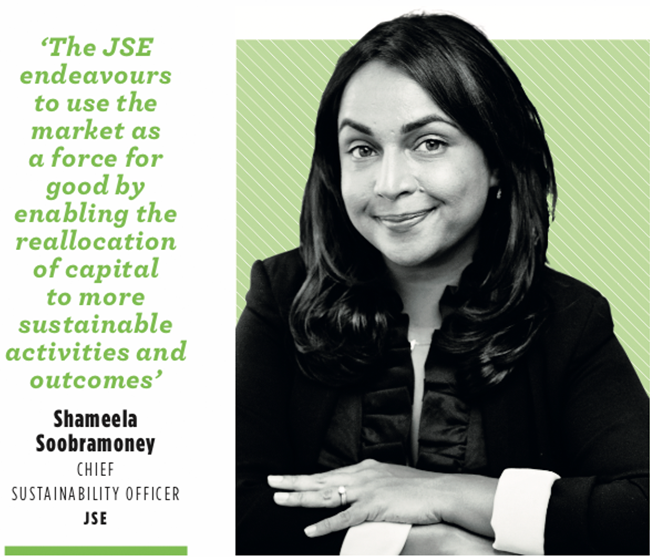The JSE was one of the first emerging markets to launch a Green Bond Segment in 2017 – which expanded into Africa’s first Sustainability Segment in 2020. And now, in 2021, the exchange is among the first to introduce a Transition Bond Segment.
While green bonds set themselves apart from conventional finance instruments by committing to raise capital for corporate or municipal projects that address climate change and promise high environmental benefits, transition bonds will target issuers wanting to raise funds for climate transition-related purposes. Also known as ‘brown’ bonds, they enable companies with a high-environmental impact or particularly large carbon footprint, such as those entirely dependent on coal and other fossil fuels, to strategically transition to the internationally established pathways towards decarbonisation and net zero.
In short, transition finance debt securities are seen as a key enablement tool for alignment with the Paris Climate Agreement.
The idea is to provide a financing mechanism that allows heavy emitters to deploy debt funding towards greener operations with the purpose of driving SA’s just transition towards a low-carbon economy, while at the same time reducing the risk of these companies ending up with stranded assets because of their high reliance on fossil fuel. This ties in with the increasing local and global appetite for impact and responsible investments. Especially in the emerging-market context, the JSE plays an important role in making SA’s financial market more resilient and enabling a progressive finance landscape.

‘The JSE endeavours to use the market as a force for good by enabling the reallocation of capital to more sustainable activities and outcomes,’ says Shameela Soobramoney, Chief Sustainability Officer at the JSE. ‘One way to do this is by putting into place dedicated segments and instruments that meet these aims. The introduction of a Transition Bond Segment is quite advanced for emerging markets. We acknowledge the fact that markets and economies are going to need to go through a process of transition – they will not move from brown to green overnight, so transition finance has strong relevance in emerging markets that, in particular, are still heavily fossil-fuel based.’
To ensure that transition bonds are utilised to achieve the desired environmental impact, rather than superficial ‘transition washing’, the JSE has based its transition debt securities on the Climate Transition Finance Handbook. This guide, published by the International Capital Market Association, provides a framework for the practices, actions and disclosures that companies need to be made available when raising funds for climate transition-related purposes. An important stipulation for transition bonds is that their issuers should clearly state how the funding will be used to support the aims of the Paris Agreement.
‘The JSE acknowledges that climate change is one of the most pressing of the sustainability challenges, and it is working to address this via the introduction of relevant instruments – such as transition bonds – to support the allocation of capital to greener outcomes. In contexts like ours, the social challenges are often as important as – and closely inter-linked with – the environmental ones, and so creating enabling environments for sustainable finance to flow is critical,’ says Soobramoney. ‘This is part of our contribution to helping create a sustainable economy.’








